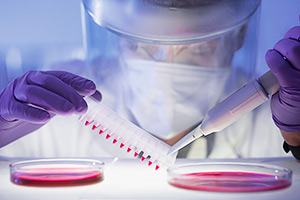MRSA Variant Now Resistant To Last Antibiotic
 A deadly strain of a hospital superbug has become resistant to a last-line antibiotic used to treat infections, scientists have warned. Although it has not spread so far, doctors said ‘the risk that Methicillin Resistant Staphylococcus Aureus (MRSA) could eventually overwhelm even our last-line drugs is a very serious one’, branding it ‘a dangerous organism in hospitals.’
A deadly strain of a hospital superbug has become resistant to a last-line antibiotic used to treat infections, scientists have warned. Although it has not spread so far, doctors said ‘the risk that Methicillin Resistant Staphylococcus Aureus (MRSA) could eventually overwhelm even our last-line drugs is a very serious one’, branding it ‘a dangerous organism in hospitals.’
American researchers have found since 2002 there have been 12 cases of the antibiotic resistant superbug CC5. It has become proficient at picking up resistance genes including the one that makes it resistant to vancomycin – the last line of defence for hospital-acquired infections.
Researcher Jim Sliwa said: ‘MRSA strains are leading causes of hospital-acquired infections in the United States, and clonal cluster 5 (CC5) is the predominant lineage responsible for these infections. Since 2002, there have been 12 cases of vancomycin-resistant S. aureus (VRSA) infection in the United States – all CC5 strains. Vancomycin is a key last-line bactericidal drug for treating these infections.’
In the study researchers sequenced the genomes of all available vancomycin-resistant MRSA strains to find what distinguishes them from other lineages and why CC5 is apparently more adept than other strains at picking up vancomycin resistance. Vancomycin-resistant MRSA strains and other CC5 lineages have some important differences from other types of MRSA, including adaptations that allow them to co-exist with other types of bacteria and may help them take up foreign DNA. It was found they lacked a set of genes that encode an antibiotic protein made by bacteria to kill other bacteria.
Mr Sliwa said: ‘This is important because it enables CC5 to get along well with other bacteria in mixed infections. Instead of killing off competing organisms, CC5 aims to co-exist. This enables it to pick up genes – like the one that encodes vancomycin resistance – from unexpected places. Mixed infections are breeding grounds for antibiotic resistance because they encourage the exchange of genes among very different kinds of organisms.’
He continues, ‘In roughly the place where these bacteriocin genes are missing is a unique cluster of genes that encode enterotoxins – proteins that attack the human host and, again, could make it easier for mixed populations of bacteria to grow at infection sites.’
Researchers also discovered CC5 has a mutation in a gene which is known to influence the ability to assimilate foreign DNA. He added: ‘This makes CC5 a dangerous organism in hospitals. In hospitals, pathogens are under continuous pressure from antibiotics to survive and evolve, and CC5 isolates appear to be very well adapted to succeed by acquiring new resistances.’
‘Frequent use of antibiotics in hospital patients could select for strains like CC5 that have an enhanced ability to co-exist with bacteria that provide genes for antibiotic resistance.’ Sliwa concluded.
The findings are published by the American Society for Microbiology.
Copyright © 2012 Daily Mail











